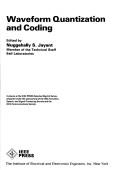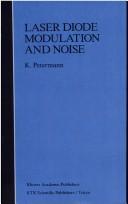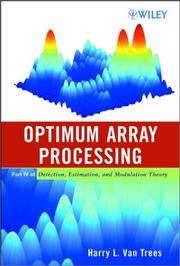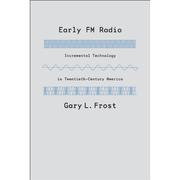| Listing 1 - 10 of 27 | << page >> |
Sort by
|
Book
ISBN: 0738180920 Year: 2011 Publisher: Piscataway : IEEE,
Abstract | Keywords | Export | Availability | Bookmark
 Loading...
Loading...Choose an application
- Reference Manager
- EndNote
- RefWorks (Direct export to RefWorks)
Approximately 100 terms and their definitions, for accurately and precisely describing the waveforms of pulse signals and the process of measuring pulse signals, are presented in this standard. Algorithms are provided for computing the values of defined terms that describe measurable parameters of the waveform, such as transition duration, state level, pulse amplitude, and waveform aberrations. These analysis algorithms are applicable to two-state waveforms havingone or two transitions connecting these states. Compound waveform analysis is accomplished by decomposing the compound waveform into its constituent two-state single-transition waveforms.
Book
ISBN: 1504401778 Year: 1964 Publisher: Piscataway, New Jersey : IEEE,
Abstract | Keywords | Export | Availability | Bookmark
 Loading...
Loading...Choose an application
- Reference Manager
- EndNote
- RefWorks (Direct export to RefWorks)
The following constitutes a revision of IEEE No.170 (53 IRE ll.Sl), "Standards on Modulation Systems: Definitions of Terms, 1953." It is not intended to cover the subject matter of Information Theory which is contained in IEEE No.171 (58 IRE ll.Sl ), IRE Standards on Information Theory: Definitions of Terms, 1958.Nevertheless, a few borderline terms, such as Coding and Nyquist Rate, have been included in the list. This merely reflects the fact that the two Standards define terms in adjoining areas of subject matter.The definitions given in this Standard are intended to reflect the latest usage and also toimprove the clarity and precision. Terms such as Capture Effect have been newly added, whileterms no longer in use, such as Two-Source Frequency Keying, have been deleted.
Book
ISBN: 142440018X 1509092617 Year: 2006 Publisher: [Place of publication not identified] IEEE
Abstract | Keywords | Export | Availability | Bookmark
 Loading...
Loading...Choose an application
- Reference Manager
- EndNote
- RefWorks (Direct export to RefWorks)

ISBN: 0879420731 087942074X Year: 1976 Publisher: New York (N.Y.): IEEE
Abstract | Keywords | Export | Availability | Bookmark
 Loading...
Loading...Choose an application
- Reference Manager
- EndNote
- RefWorks (Direct export to RefWorks)
Coding theory --- Pulse modulation (Electronics) --- Signal processing --- Processing, Signal --- Information measurement --- Signal theory (Telecommunication) --- Modulation (Electronics) --- Pulse techniques (Electronics) --- Telecommunication --- Data compression (Telecommunication) --- Digital electronics --- Information theory --- Machine theory --- Computer programming --- Coding theory. --- Signal processing. --- Pulse modulation (Electronics). --- Télécommunications

ISBN: 9027726728 079231204X 9400929072 Year: 1991 Publisher: Dordrecht : Kluwer,
Abstract | Keywords | Export | Availability | Bookmark
 Loading...
Loading...Choose an application
- Reference Manager
- EndNote
- RefWorks (Direct export to RefWorks)
Modulation (Electronics) --- Semiconductor lasers --- -#TELE:TMIC --- Lasers --- Radio modulation --- Electronics --- Modulation theory --- Radio --- Signal theory (Telecommunication) --- Noise --- Semiconductor lasers. --- Noise. --- Modulation (Electronics). --- #TELE:TMIC
Book
ISBN: 1849196230 Year: 2012 Publisher: Stevenage, England : IET,
Abstract | Keywords | Export | Availability | Bookmark
 Loading...
Loading...Choose an application
- Reference Manager
- EndNote
- RefWorks (Direct export to RefWorks)
Radio frequency --- Radio frequency modulation --- FM radio --- Frequency modulation, Radio --- Angle modulation --- Modulation (Electronics)

ISBN: 0471093904 0471095176 0471446785 9780471446781 9780471095170 9780471093909 Year: 2002 Publisher: New York (N.Y.) Wiley
Abstract | Keywords | Export | Availability | Bookmark
 Loading...
Loading...Choose an application
- Reference Manager
- EndNote
- RefWorks (Direct export to RefWorks)
Modulation (Electronics) --- Théorie du signal (Télécommunications) --- Modulation (Electronique) --- Modulation (Electronics). --- Signal theory (Telecommunication) --- Estimation theory --- Estimation theory. --- Signal theory (Telecommunication). --- Théorie du signal (Télécommunications) --- Théorie de l'estimation

ISBN: 0801899133 0801894409 Year: 2010 Publisher: Baltimore, Md. : Johns Hopkins University Press,
Abstract | Keywords | Export | Availability | Bookmark
 Loading...
Loading...Choose an application
- Reference Manager
- EndNote
- RefWorks (Direct export to RefWorks)
"The commonly accepted history of FM radio is one of the twentieth century's iconic sagas of invention, heroism, and tragedy. Edwin Howard Armstrong created a system of wideband frequency-modulation radio in 1933. The Radio Corporation of America (RCA), convinced that Armstrong's system threatened its AM empire, failed to develop the new technology and refused to pay Armstrong royalties. Armstrong sued the company at great personal cost. He died despondent, exhausted, and broke." "But this account, according to Gary L. Frost, ignores the contributions of scores of other individuals who were involved in the decades-long struggle to realize the potential of FM radio. The first scholar to fully examine recently uncovered evidence from the Armstrong v. RCA lawsuit, Frost offers a thorough revision of the FM story." "Frost's balanced, contextualized approach provides a much-needed corrective to previous accounts. Navigating deftly through the details of a complicated story, he examines the motivations and interactions of the three communities most intimately involved in the development of the technology - Progressive-era amateur radio operators, RCA and Westinghouse engineers, and early FM broadcasters. In the process, Frost demonstrates the tension between competition and collaboration that goes hand in hand with the emergence and refinement of new technologies." "Frost's study reconsiders both the social construction of FM radio and the process of technological evolution. Historians of technology, communication, and media will welcome this important reexamination of the canonic story of early FM radio."--Jacket.
Radio frequency modulation --- Transmitters and transmission --- History. --- FM radio --- Frequency modulation, Radio --- Angle modulation --- Modulation (Electronics) --- Geschichte 1913-1940
Book
ISBN: 1424417562 1424417570 1509076905 Year: 2008 Publisher: [Place of publication not identified] IEEE
Abstract | Keywords | Export | Availability | Bookmark
 Loading...
Loading...Choose an application
- Reference Manager
- EndNote
- RefWorks (Direct export to RefWorks)
Adaptive antennas --- Modulation (Electronics) --- Electrical Engineering --- Electrical & Computer Engineering --- Engineering & Applied Sciences --- Radio modulation --- Electronics --- Modulation theory --- Radio --- Signal theory (Telecommunication) --- Antennas (Electronics)
Book
ISBN: 3781559920 3781525503 Year: 2023 Publisher: Bad Heilbrunn, Germany : Verlag Julius Klinkhardt,
Abstract | Keywords | Export | Availability | Bookmark
 Loading...
Loading...Choose an application
- Reference Manager
- EndNote
- RefWorks (Direct export to RefWorks)
Der Band lotet Perspektiven einer rekonstruktiv-sinnverstehenden Forschung für die Untersuchung von Schule und Unterricht im digitalen Wandel aus. Es werden vier empirische Studien vorgestellt und ihre Befunde theoretisch und methodisch eingeordnet. Die Studien interessieren sich für die Veränderungen wie auch die Stabilität von Praktiken im Unterricht, wenn digitale Medien genutzt werden. Und sie untersuchen, wie Schüler:innen und Lehrkräfte die mit der Digitalisierung einhergehenden Transformationsprozesse deuten. Die generierten Forschungsperspektiven werden durch die Diskussion der Erträge der Studien im Hinblick auf zentrale Fragen des digitalen Wandels und seine Erforschung am Ende des Bandes vertiefend konturiert.
Digital media. --- Digital modulation. --- Media literacy. --- Mass media literacy --- Information literacy --- Digital communications --- Modulation (Electronics) --- Electronic media --- New media (Digital media) --- Mass media --- Online journalism
| Listing 1 - 10 of 27 | << page >> |
Sort by
|

 Search
Search Feedback
Feedback About UniCat
About UniCat  Help
Help News
News